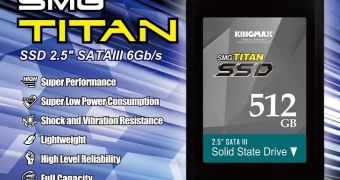Solid-state drives are naturally tougher than HDDs, because they have no moving parts to rattle in a fall, but there are still large differences between normal drives and rugged ones. The latest models from Kingmax show that.
It bears mentioning that the new storage units are not, in fact, advertised as rugged storage devices, but they definitely have the qualifications. Or some of them.
They can withstand 1,500 G/s shocks, and temperatures of 0 – 70 degrees Celsius / 158 degrees Fahrenheit.
Also, when it's just for long-term storage, it's no problem if the SSD lies in an area with -55 to 95 degrees Celsius / -67 to 203 degrees Fahrenheit.
There's the RAISE fault-tolerant technology to consider as well, which provides data loss protection beyond ECC capabilities, though error correction code is still supported.
Cyclic Redundancy Check (CRC) is also present, a wear management and NAND Flash chip monitoring function that prolongs lifespan of the unit.
Basically, if you buy a Kingmax SMG Titan solid-state drive, you'll be able to sit back and relax for a good, long while.
As for performance, we dare say that the solid-state storage units are among the fastest out there, with 550 MB/s maximum read speed and 520 MB/s top writing speed.
Only the 64 GB drive is slower, and only when it comes to writing: 500 MB/s instead of 550 MB/s.
Speaking of which, there are five SSDs in the Kingmax SMG Titan line, with space of 64 GB, 128 GB, 256 GB and 512 GB, respectively.
Native Command Queuing (NCQ) is installed on them all, a technology that optimizes the order of file data accessing sequence to increase work efficiency. It's no wonder that Kingmax expects its creations to score points with enterprise customers.
Not that the corporation is going to keep access to the newcomer limited. In fact, the press release doesn't really emphasize the enterprise-grade endurance and performance all that much.
Even the 1.2 million Hours MTBF (1 million is considered good) and 3-year warranty are only mentioned as general tidbits, not key features despite them being superior to other offers.
Admittedly, SSDs sell with 3-year warranties often enough, but many more devices and pieces of hardware ship with vague “lifetime warranties” (marketing lifetime, not your lifetime) or 1-2-year coverage. Sadly, prices were kept under wraps.

 14 DAY TRIAL //
14 DAY TRIAL //